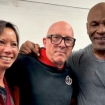Pick up TOOL's Lateralus on 2LP picture disc vinyl at Revolver's shop.
Adam Jones is marveling at "Lateralus," the title epic from TOOL's third LP — both its labyrinthine construction and fans' equally intense obsession.
"The problem is that sometimes it goes too far, and there are people who think we're wizards — everything, every number we use, has a hidden meaning and a message," the guitarist tells Revolver with a laugh. "It's just not true. There are elements of that, but not that complex. We have better things to do. But if that's what someone gets out of it, and it's positive, then great."
He's referring specifically to the Fibonacci sequence, a mathematical pattern in which each number is the sum of the previous two: 0, 1, 1, 2, 3, 5, 8, 13, 21, 34, 55, 89, 144, 233, 377, 610, 987 and so on. Closely linked to the golden ratio, the sequence frequently occurs in nature, like with seashells and flower petals. It's also inspired many brilliant works of art — including, inadvertently, "Lateralus," a fact that has intrigued listeners endlessly in the years since.
While workshopping that 2001 opus, TOOL weren't searching for grand rhythmic concepts. They were just ironing out material for the follow-up to 1996's Ænima, the Grammy-winning classic that saw them transitioning from bad-trip alt-metal into heady, wide-screen progressive rock. But, as usual, the quartet — Jones, singer Maynard James Keenan, bassist Justin Chancellor and drummer Danny Carey — had their antennas up, ready for the next Big Idea to beam in from the ether.
"Justin brought in this amazing bass riff," Jones recalls. "He said, 'The first part's in 9, the second part's in 8 and the last part's in 7.' Danny has a big influence on us with his [vast] knowledge — he's a very analytical guy. He was into a lot of that sacred geometry stuff, which influenced us. He was sitting behind his kit, and I remember him going, '[987] is a number of the Fibonacci. That's really cool.'"
It could have just been a trippy observation. But after the band's friend Ryan, a hotshot firefighter and "amazing intellect," further outlined the sequence's history, they'd burrowed deep down the rabbit hole. "We started writing — and since we're a very math-based band, we started exploring different themes in that," Jones says. "We told Maynard, and he went, 'Oh, my god, I'll write my lyrics like that!'" The singer ultimately built some of his phrases in a syllabic structure, climbing from the first to sixth numbers and back down again.
"Those are the kinds of things I really do enjoy about the band," Jones enthuses. "Instead of just jamming riffs, there's a lot more thought behind it. There are weird concepts. There are inside jokes. We love this journey we're all on: the complex things of life, the simple things of life. Talking and bullshitting in the rehearsal space, these concepts come up in a very intellectual way — almost like in a classroom — and then we apply them to the music."

That studiousness is a through-line of the TOOL catalog — the connective tissue bonding the primal heaviness of their debut EP, 1992's Opiate, to the psychedelic prog atmospheres of their latest record, 2019's Fear Inoculum. But looking back at Lateralus two decades later, Jones recognizes this album as a creative turning point: Working with returning producer David Bottrill, they expertly balanced the esoteric and the emotional, the goofy (ambient interlude "Mantra" features the slowed-down sound of Keenan squeezing one of his cats) and the grandiose. Keenan's lyrics had become more subtly philosophical, as the music behind him swelled to a level of intricacy rare in mainstream rock or metal. With Lateralus, it no longer felt quite accurate to lump them in either category: TOOL has become something singular and uncontainable. Even the visual elements — Jones' unsettling, stop-motion-filled videos, the cosmic-spiritual sleeve art of Alex Grey, the psychedelic live projections — were now immersive and fully intertwined with the sound, creating an entire TOOL universe.
"I think it's an excellent observation," Jones says of the idea of Lateralus as a crucial crossroads for the band. "We had a couple records under our belt and [lots of] touring, so practice makes perfect. By that time, we knew our limits. We knew what stuff we could push. We were a well-oiled machine. And we knew each other. And there were things we learned about each other on that record that are pivotal to this day."
The most critical lesson: Not everyone in the band operates at the same pace. Jones, Chancellor and Carey are now notorious (and/or revered) for their meticulous jamming — tweaking and jettisoning and reviving and rearranging ideas. Eventually, there was a "turning point" during that process, Jones says — a "big confrontation that came out all at once."
"There are four different guys, four different cooks," he says. "We're not throwing punches at each other. But we all have our opinions. We're brothers, and sometimes it's really hard to communicate. We have an open dialogue, at least I do, and sometimes it's hard to say things like, 'I'm frustrated with you' or 'I'm having a problem with this' or 'I hate your fucking guts.'" He laughs. "That little thing you hate about your brother, you really hate the 12th time it happens. I think a lot of things bubbled up. I don't know. I almost want to cry about it. It was such a thing that needed to happen, and it happened and made everything else better."
As Jones points out, tension is an inevitable part of any collaboration. Plus, once they arrived at their natural writing dynamic — Keenan adding lyrics and melodies to his bandmates' finished instrumentals — they became even closer.
"The beautiful thing was that — like popping a big zit — once it came out, it healed," he says. "Now it's better than it's ever been. Basically, what we learned, especially between Maynard and I, is that everyone has their own way of working. That's what came out of that — to have that respect for each other about our process. Maynard's like, 'I can't handle you writing and then changing stuff when I'm trying to write lyrics. So, let me know when you're done and then I'll do what I do.' And it's great. It really works. Sometimes it's just frustrating because you think he's gonna sing here and not here, but he does the opposite. And that's the beauty of it. Because of that, it's a blessing in disguise where it really fine-tunes the music to hold up on its own. When we write, we have no idea where he's gonna sing, so the song almost works as its own instrumental."
Even after TOOL cleared the air, there were other distractions and digressions to be navigated. Some were hugely frustrating, like the lawsuit the band's then-label Volcano Entertainment filed against them, citing a "wrongful attempt" at abandoning their contract. Others were healthy and even productive, such as Keenan launching the band A Perfect Circle with roommate and former TOOL guitar tech Billy Howerdel and releasing the group's 2000 debut, Mer de Noms.
"It needed to happen," Jones says of Keenan's other group. "It happens in other bands where you get sick of each other and want to try something new. The band's very eclectic, so maybe there are things that he or Danny — in his other projects — want to get out that they're not getting in TOOL, which is fine."
"There's the uncertainty of it," he continues. "When are you touring, and when are we touring? When is our record coming out? When is your record coming out? Sometimes that communication is suffering. But you suck it up, hug it out and move on. I support the stuff our bandmates want to do on their own or with other bands. It's only gonna make what we do stronger. If you're not expressing that thing burning inside you, maybe what you're doing — even though it's good — is not going to be satisfying."
Meanwhile, TOOL's riff mountain was only growing. Their process, still intact to this day, is to work on any idea someone brings in — often with Chancellor starting a verse and Jones contributing the chorus, or vice versa, as Carey adds rhythmic complexity.
"Justin brings in riffs, and I will never ever say, 'I don't like that,'" Jones says. "Sometimes I think it. But I have to play it because what comes out of it can be something completely different that I couldn't even comprehend. An example would be …" He plays a riff from 10,000 Days cut "Jambi" on guitar. "Justin brought in that riff, and I was like, 'What? What is this?' I could have just gone, 'Forget it. Let's play something we all like.' But instead, it was me accepting Justin and connecting with him and trying to get inside his head and see something the way he sees it." Now it's "up there" among Jones' favorite TOOL songs.
Classic evidence of their writing balance is "Schism," Lateralus' iconic lead single. It's a twitchy monster that builds from one of heavy music's most iconic bass riffs into a maze of time-signature changes and Keenan's poetic images of strained communication. "It's a hell of a song," Jones notes, accurately.
"Justin is a riff-writing machine, and I love him for it," he says, recalling how the bassist started off that cut. "One of us brings in a riff, and it gets kind of pulled apart, tugged at, in our process. Dan will start drumming to it. I work simple and then get a little more complex, but Dan and Justin will go complex and then fine-tune to something simple. That's why it clicks."
The most difficult part is actual composition — sifting through these seeds and structuring them into coherent songs. But sonic breakthroughs inevitably lead them somewhere new: A good example in "Schism" is the clean, atmospheric riff that bubbles up around the four-minute mark.
"That middle thing: It's just something you feel," Jones says. "Do you want to write a three-minute song, or do you want to write a seven-minute song that has another feel in it? We do this verse-chorus/verse-chorus, and a lot of times we'll do some kind of jam. Then it just needs to take a breath. That middle riff — it's almost like giving birth to something and watching it grow again to the end. We like to play! We don't want to stop. That's the curse of TOOL." He laughs. "It's hard to write a three-minute song. It's hard to write a four-minute song. It starts, and it ends, and that's the time. We never go, 'It's too long, or it needs to be longer.' It's just what the song needs."
The same description applies to Lateralus, epics and segues alike — there isn't a wasted second. While it's natural to focus on the record's proggy and intellectual qualities, TOOL — the same band that once created a hilarious fake bio to weed out lazy journalists — again showed their mischievous side in the pre-release roll-out, teasing a fake album title (Systema Encéphale) and song names (like "Mummery," "Lactation" and "Riverchrist") on their website.

"Maynard is very funny. I always thought he'd either be a stand-up comic or an actor if he wasn't in a band," Jones says. "Some of that stuff is just because you're good friends and have these inside jokes that keep coming up. But there was another reason. I think it was Lateralus where someone bought the domain name of the record title and tried to copyright all the song names — real sleazy stuff. They started selling T-shirts. So, we put out a press release where everything was fake. We had 10 tracks, and they were all fake. Sure enough, someone bought the [domain], and someone put out the fake name T-shirts. We had the last laugh on that." What a hilarious image: Someone out there may still be rocking a Riverchrist tee.
Released on May 15th, 2001, with its 13, properly titled tracks, Lateralus proved the commercial and critical gains of Ænima were no fluke: The new LP peaked atop the Billboard 200, with "Schism" taking home the Grammy for Best Metal Performance. But more impressive for Jones, TOOL were now influential enough that they could recruit prog giants King Crimson — led by one of his biggest guitar inspirations, Robert Fripp — to open a stretch of their summer tour dates.
"That was amazing. I remember it all," Jones says of that brief joint run. "I love King Crimson. Robert Fripp is as much a hero to me as Eddie Van Halen, and I think they're in the same caliber. Robert Fripp is a virtuoso and is beyond his time. To share a stage with them and have them open for us — oh, my god. We worked out this thing where their set kind of flowed into our set, and Robert and I did a soundscape at the end of one of our tunes. Just think of 12-year-old me or 14-year-old me listening to [King Crimson's] 'Cat Food' or something."
Other memories from the Lateralus tour remain just as vivid — for much different reasons. The horror of the 9/11 terror attacks occurred four months into the trek, a couple days after the band's performance in Rosemont, Illinois.
"I remember leaving my hotel, getting off the elevator as the B-52s were getting on the elevator. I'm a big B-52s fan," Jones recalls. "I think we were in Chicago. We went to a store, and [a sign] said, 'Due to this morning's events, we've closed the store down.' We said, 'What?' And someone said, 'Didn't you hear? They're bombing New York City!' I went to the hotel room, and I think the first building had come down. It was mind-blowing."
With a show already booked for September 13th in Grand Rapids, Michigan, the band scrambled to figure out their plans. "Our tour was going to end up in New York [at Madison Square Garden]," Jones says. "We were like, 'What are we gonna do?' That show in Grand Rapids was hard because that's one of the places May-nard grew up. We were horrified, just like everyone else. We were also disappointed because we'd heard all these stories where people were defacing the businesses of brown people and breaking their windows. It was just horrible. I think that's why Maynard started talking about it onstage, and we had to learn really quickly that there's a right time and a wrong time to express what's going on, especially after something like that happens. But almost between every song from thereon out, people would start chanting 'U.S.A.' It was just a collective coming together."
"When I think about Lateralus, I don't think about 9/11," he adds. "That's not what I take away when I listen to that record. But it's another notch of healing kind of reflected in that music."
Everything about this album was healing for Jones: the writing, the mutual understanding TOOL achieved, the music itself. "Those guys always blow me away — all three of them," he says of his bandmates. "I learn so much from them, even when we don't get along. My friend Buzz [Osborne] from the Melvins says, 'If it's worth having, it's worth suffering for' — through the time it takes, the anguish, the dysfunction of four guys trying to get to the center."
"Lateralus," "Schism," "The Grudge," "Parabola" — these are monumental achievements. And Jones knows it. "I'm a fan! I really like our stuff. I geek out on it," he says. "I recently put up an Instagram video where my kid's in the car and we're listening to 'daddy's music.' Our stuff's just slamming, and I pan to the back and our kid's asleep. It was this funny moment. A lot of the comments were like, 'God, don't you have better things to do than listen to your own music?' Yeah, I listen to our music! I'm really proud of what we do, and that's the way it should be.
"To have the talent and luck to be with these guys, to be married to these guys, I could die tomorrow and be the happiest guy."








